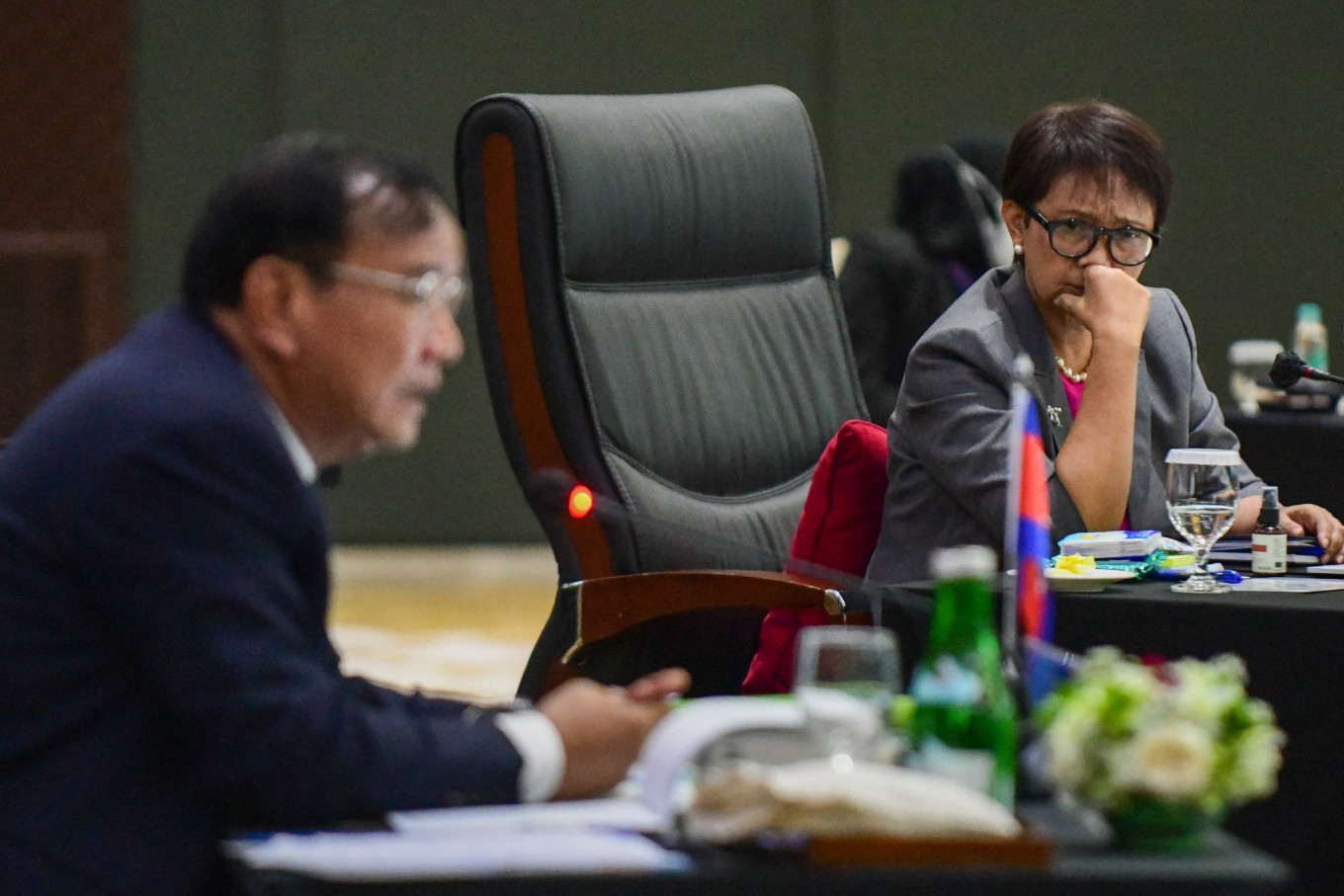Popular Reads
Top Results
Can't find what you're looking for?
View all search resultsPopular Reads
Top Results
Can't find what you're looking for?
View all search results‘Resilient’ ASEAN tops RI foreign policy priorities
Indonesia guarantees that the Myanmar coup crisis will not hold ASEAN hostage and keep it from pursuing other collective interests, especially in the economy.
Change text size
Gift Premium Articles
to Anyone
A
mid the gloomy forecast for 2023, reinforcing ASEAN’s resilience, both politically and economically, will top Indonesia’s priorities, Foreign Minister Retno LP Marsudi said in her annual foreign policy speech on Wednesday.
The elephant in the room, the Myanmar coup crisis, featured prominently as Southeast Asia’s biggest economy assumes the chairmanship of the bloc. However, Retno vowed not to let ASEAN dwell on it for too long.
“Amid difficult global challenges, a positive outlook, cooperation and optimism are even more necessary. [...] The history and story of ASEAN have always been related to the economy,” she proclaimed at the event in Jakarta.
“The Indonesian chairmanship will ensure that the development of the ASEAN community will remain a focus. The issue of Myanmar will not take ASEAN’s development process hostage.”
Glacial progress has hampered the region’s peace initiative for Myanmar, encapsulated in the conception of the Five-Point Consensus (5PC), a list of guiding principles to allow for national reconciliation and humanitarian assistance – two years after the putsch.
Some analysts have described it as one of the bloc’s most exasperating challenges, with the military regime in Naypyidaw not only defying calls for a return to normalcy but also escalating their offenses. Seeming to be at its wits’ end, the very integrity of the 10-nation ASEAN has been relentlessly scrutinized by its sharpest critics.
But Retno asserted that the 5PC would remain at the heart of the association’s engagement strategy with the junta, while also announcing that an Office of the ASEAN Special Envoy would be set up and led by her ministry.
With Indonesia as ASEAN chair, the minister pledged to engage with all stakeholders in Myanmar, including with the prodemocracy opposition – and without needing to seek permission from the junta regime.
“Only through engagement with all stakeholders can the 5PC’s mandate on facilitating the creation of a national dialogue be carried out,” Retno insisted.
Money matters
By no means would the Myanmar crisis overshadow the interests of the other nine ASEAN member states, Retno made clear, especially in the crucial economic sectors.
A string of bilateral and multilateral cooperation initiatives is on the cards, including the expected conclusion of two ASEAN comprehensive economic partnership agreements (CEPAs) – one with the Southern Common Market (MERCOSUR) and another with the European Union.
In the wider regional context, a new ASEAN Indo-Pacific Forum would feature flagship events for expanding the region’s interests in infrastructure, trade and investment.
Coordinating Economic Affairs Minister Airlangga Hartanto said on Wednesday that one of Indonesia’s priorities under its ASEAN chairmanship was to boost intra-ASEAN trade.
“This is an opportunity for Indonesia to improve its market share within ASEAN,” the senior minister told reporters.
Many of the reasons for this emphasis on economic cooperation can be tied back to the challenges that 2023 offers. Retno explained that Indonesia was bracing for steep challenges ahead, with major power rivalries, recession and food scarcities continuing to loom large.
A September 2022 study by the World Bank, for instance, found that the global core inflation rate was at risk of increasing by 5 percent this year without accounting for energy prices. Meanwhile, the World Food Programme warned that the population facing acute food insecurity would double this year, possibly resulting in more destabilization.
But while some project Southeast Asia will be shielded from much of the headwinds, the ASEAN chair would still tread on the side of caution, Retno said.
“Indonesia is determined to make Southeast Asia the center for regional economic growth,” she said.
ASEAN was among the fastest-growing regions of the world in 2022, and looks to remain an attractive global investment destination this year despite revised forecasts.
When considered as one entity, the region was the fifth-largest economy with an aggregate size of US$3.2 trillion in 2019. Analysts have also noted that nations in the region are seeing faster-than-average gross domestic product (GDP) growth, which reflects, among other things, the rise of increasingly liberal trade policies.
Even so, analysts have urged caution on more ambitious plans, especially those being sought with ASEAN’s nontraditional partners.
“There needs to be a shift from the thinking that more free trade agreements equal more profits. When we talk about MERCOSUR, or the Latin American market – we simply do not have any infrastructure for the logistics,” said Yose Rizal Damuri, executive director of the Centre for Strategic and International Studies (CSIS).
“Instead, we should prioritize our most strategic partners like the EU. The Indonesia-EU CEPA has been more than seven years in the making – these partnerships are what would be most preferable,” the economist said.
It is also impossible to treat intra-ASEAN trade as a separate matter from the trade gains from bigger partners such as the United States and China, Yose said. The region’s fate is, for better or worse, interconnected with the superpower rivalries, he insisted.
Shopping list
Indeed, the Indo-Pacific and its primacy as the site of global power tensions were high on the list of Indonesia’s foreign policy priorities, Minister Retno said.
Cooperation on several issues including agriculture will be strengthened in 2023, and “concrete and inclusive cooperation” will be “encouraged”.
Lina Alexandra, head of the international relations department at the CSIS, applauded the fresh emphasis on the implementation of the ASEAN Outlook on the Indo-Pacific, but said that more details were needed for further analysis.
Apart from advancing economic cooperation, Retno also said Jakarta would place emphasis on border negotiations, citizen protections and peace efforts in Palestine and Afghanistan.
— Fadhil Haidar Sulaeman contributed to the report










